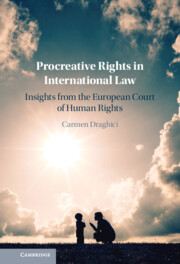Book contents
- Procreative Rights in International Law
- Procreative Rights in International Law
- Copyright page
- Dedication
- Contents
- Table of International Cases
- Table of International Instruments
- Introduction
- 1 Parenthood Aspirations and Justiciable Rights
- 2 A Right to a Genetically Related Child?
- 3 A Right to the Recognition of Intentional Parenthood?
- 4 A Right to a Healthy Child?
- 5 The Quest for Reproductive Equality
- Conclusions
- Select Bibliography
- Index
5 - The Quest for Reproductive Equality
The Challenges of Sexual Orientation, Gender and Civil Status
Published online by Cambridge University Press: 26 April 2024
- Procreative Rights in International Law
- Procreative Rights in International Law
- Copyright page
- Dedication
- Contents
- Table of International Cases
- Table of International Instruments
- Introduction
- 1 Parenthood Aspirations and Justiciable Rights
- 2 A Right to a Genetically Related Child?
- 3 A Right to the Recognition of Intentional Parenthood?
- 4 A Right to a Healthy Child?
- 5 The Quest for Reproductive Equality
- Conclusions
- Select Bibliography
- Index
Summary
Chapter 5 examines the impact of gender, sexual orientation and civil status on access to ART and the enjoyment of family life formed through ART. Aspiring single parents, women in a relationship with a same-sex or transgender male partner, and men in a same-sex relationship are reliant on gamete donation (as well as, in the case of male couples, surrogacy) in order to have a biological child and are particularly disadvantaged by prohibitions on third-party reproduction. These remain, nonetheless, within States’ margin of appreciation. However, where a child was born following the use of donated gametes or surrogacy abroad, the Strasbourg Court requires measures of protection. Significantly, the relationship of surrogate-born children with the intended non-biological parent is equally protected whether the genetic father has an opposite-sex or same-sex spouse. The chapter criticises, however, the less favourable treatment of commissioning mothers based on a conservative understanding of motherhood as gestational.
Keywords
- Type
- Chapter
- Information
- Procreative Rights in International LawInsights from the European Court of Human Rights, pp. 234 - 289Publisher: Cambridge University PressPrint publication year: 2024

